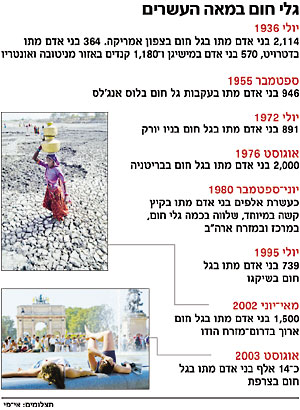Researchers predict a difficult summer for those who remain in Paris, Tel Aviv or Chicago in 2080
Yuval Dror, Haaretz, voila!

The Israeli summer is humid and sticky, but it is rarely characterized by extreme heat waves, which take a toll on the soul. Researchers who analyzed a global prediction model estimate that the heat waves that hit the world once every few years will become longer, more severe and more frequent in the future.
The good news is that the hard forecast concerns the years 2099-2080. The bad news is that the Middle East, and Israel within it, will be one of the regions that will suffer from the worsening in particular. The two researchers, Gerald Meehl and Claudia Tabaldi from the Center for Atmospheric Research in the USA, published their gloomy predictions in the journal "Science".
A heat wave is an extreme rise in temperatures, which continues unabated and prevents residents from recovering. In the heat wave that hit Paris last year, for example, the temperatures rose from 23 degrees, typical for August in France, to 40 degrees. Heat waves do not have an agreed upon characteristic, although they have been known for a long time. However, write the researchers Mihal and Tabaldi, it can be said that they "take a toll on the soul, affect the economy in the affected area and ecological systems."
In the 20th century, several heat waves occurred, which caused the death of thousands of people. In July 1936, for example, more than 2,000 people died in the United States and Canada as a result of a heat wave, in July 1995 739 people died in a heat wave in the Chicago area, and the long heat wave that hit France last summer led to the death of about 14 thousand people.
The model created by the researchers referred to the heat waves and the weather in general in the world during the twentieth century, and took into account the situation of the hole in the ozone, the emission of greenhouse gases into the atmosphere, the eruption of volcanoes and more. The researchers built the model based on data collected between 1961 and 1990, which they consider to be representative years. The researchers based their forecast for the 21st century on the assumption that there will be no significant change in the policy of emitting greenhouse gases into the atmosphere, which causes global warming.
The forecast is not encouraging. If in the 20th century there were an average of 1.66 heat waves per year, then towards the end of the 21st century there will be 2.44 heat waves per year (an increase of 25%). Chicago and Paris, which have already suffered from heat waves in the past, will continue to suffer from them in the future as well. In Paris, a 31% increase is expected in the average number of heat waves that attack the city each year.
Heat waves in the city will also be longer: today an average Parisian heat wave lasts between nine and 13 days, but in the future it will last between 12 days at best, and 17 days at worst. The heat waves will also be longer in Chicago: today they last between five and a half to nine days; Towards the end of the 21st century, an average heat wave will last between eight and a half to nine and a half days. And if that's not enough, the researchers estimate that the heat waves will also be more severe and hotter.
Some areas are prone to special disaster. "Regions that are already suffering from heat waves, such as the Southwest, Southeast, and Midwest of the United States, as well as the Middle East region, may suffer from even more severe and severe heat waves," the researchers write. "Also other regions, such as the northwest of the USA, France, Germany and the Balkans, may experience an increase in the severity of heat waves and their impact on the residents, because they are not prepared to deal with them."
